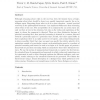Free Online Productivity Tools
i2Speak
i2Symbol
i2OCR
iTex2Img
iWeb2Print
iWeb2Shot
i2Type
iPdf2Split
iPdf2Merge
i2Bopomofo
i2Arabic
i2Style
i2Image
i2PDF
iLatex2Rtf
Sci2ools
128
click to vote
AI
2007
Springer
2007
Springer
Audiences in argumentation frameworks
Although reasoning about what is the case has been the historic focus of logic, reasoning about what should be done is an equally important capacity for an intelligent agent. Reasoning about what to do in a given situation - termed practical reasoning in the philosophical literature - has important differences from reasoning about what is the case. The acceptability of an argument for an action turns not only on what is true in the situation, but also on the values and aspirations of the agent to whom the argument is directed. There are three distinctive features of practical reasoning: first, that practical reasoning is situated in a context, directed towards a particular agent at a particular time; second, that since agents differ in their aspirations there is no right answer for all agents, and rational disagreement is always possible; third, that since no agent can specify the relative priority of its aspirations outside of a particular context, such prioritisation must be a pr...
Related Content
| Added | 08 Dec 2010 |
| Updated | 08 Dec 2010 |
| Type | Journal |
| Year | 2007 |
| Where | AI |
| Authors | Trevor J. M. Bench-Capon, Sylvie Doutre, Paul E. Dunne |
Comments (0)

